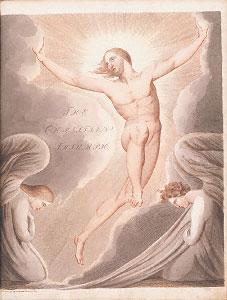From Blake's Prophetic Workshop, Page 46:
"The poem's substantial achievement lies primarily in the way its experimental composite form delivers its powerful content. Blake's 'epic' exceeds the boundaries of its difficult, problematic structure because it treats both as meaning and as a means to individual and social liberation. I do not, I believe, simply invert formalistic assumptions about unity. Nor do I hedge the problem of formal incoherence. I try various critical approaches that direct attention to the contexts, both intrinsic and extrinsic, that readers must engage to participate in Blake's visionary epic theater.
Content and form need not perfectly align for a work to have impact. If a work lacks formal perfection, it can create an impact through sheer power. Its impact can reside in the force that links content and form, reverberating beyond the confines of artistic structure. I agree with Erdman that history is the force that disrupts the narrative structure of The Four Zoas, but I do not devalue the poem for this disruption. I think, rather, that the link between content and form can become a 'call' toward the social situation in which the work is created and received. I call this the kerygmatic meaning of the narrative."
ON HOMERS POETRY, (E 269)
"Every Poem must necessarily be a perfect Unity, but why Homers is
peculiarly so, I cannot tell: he has told the story of
Bellerophon & omitted the judgment of Paris which is not only a
part, but a principal part of Homers subject
But when a Work has Unity it is as much in a Part as in the
Whole. the Torso is as much a Unity as the Laocoon
As Unity is the cloke of folly so Goodness is the cloke of
knavery Those who will have Unity exclusively in Homer come out
with a Moral like a sting in the tail: Aristotle says Characters
are either Good or Bad: now Goodness or Badness has nothing to do
with Character. an Apple tree a Pear tree a Horse a Lion, are
Characters but a Good Apple tree or a Bad, is an Apple tree
still: a Horse is not more a Lion for being a Bad Horse. that is
its Character; its Goodness or Badness is another consideration.
It is the same with the Moral of a whole Poem as with the Moral
Goodness
of its parts Unity & Morality, are secondary considerations &
belong to Philosophy & not to Poetry, to Exception & not to Rule,
to Accident & not to Substance. the Ancients calld it eating of
the tree of good & evil.
The Classics, it is the Classics! & not Goths nor Monks, that
Desolate Europe with Wars."
 |
| British
Library Four Zoas Manuscript Page 95 |
Four Zoas, Night VII, PAGE 87 [95] (FIRST PORTION) "For far & wide she [Vala] stretchd thro all the worlds of Urizens journey And was Ajoind to Beulah as the Polypus to the Rock Mourning the daughters of Beulah saw nor could they have sustaind The horrid sight of death & torment But the Eternal Promise They wrote on all their tombs & pillars & on every Urn These words If ye will believe your Brother shall rise again In golden letters ornamented with sweet labours of Love Waiting with Patience for the fulfilment of the Promise Divine And all the Songs of Beulah sounded comfortable notes Not suffring doubt to rise up from the Clouds of the Shadowy Female Then myriads of the Dead burst thro the bottoms of their tombs Descending on the shadowy females clouds in Spectrous terror Beyond the Limit of Translucence on the Lake of Udan Adan These they namd Satans & in the Aggregate they namd them Satan"









